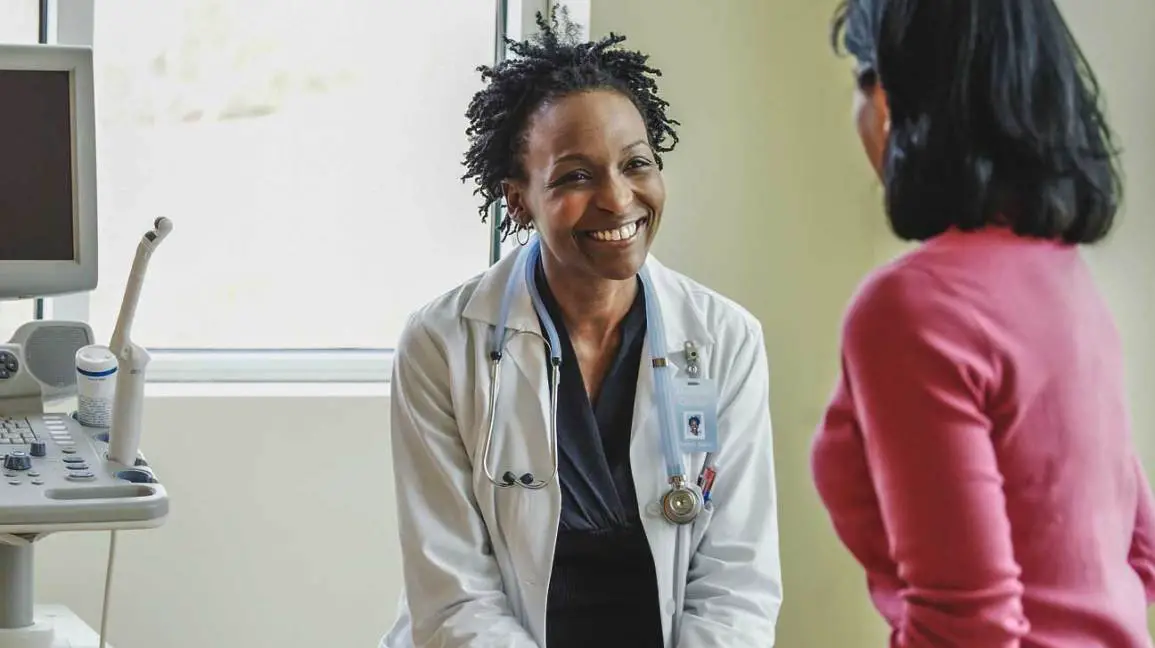An obstetrician-gynecologist, also known as OB-GYN, is a healthcare practitioner who specializes in female reproductive health. Individuals who were trained as OB-GYNs have comprehensive knowledge in both obstetrics and gynecology:
- Obstetrics is about working with pregnant women, including delivering babies
- Gynecology pertains to the female reproductive system, attending a wide range of ailments, including sexually transmitted infections (STIs) and chronic pain
We will look at what an OB-GYN is, what methods they can perform, their credentials, and when they should visit them. We will also talk about how a person can become an OB-GYN.
Who is an OB-GYN?
An OB-GYN is a medical specialist that has extensive and special training in obstetrics and gynecology. They deliver an extensive range of preventative care services, including STI testing, ultrasounds, pap smears, pelvic exams, and blood work.
You can ask them questions relating to pregnancy, infertility, sex, reproductive health, and several other topics.
However, recommendations differ with age and difference with time; many women visit their OB-GYNs at least once in a year—some utilize these medical specialists as their primary doctor.
Researchers reviewed women about their use of several physicians and discovered that about 56%, between 18 to 40 years, visit only an OB-GYN every year.
What treatments do they conduct?
OB-GYNs are qualified surgeons who can conduct an extensive range of procedures, including:
- Cesarean sections
- Instrumental deliveries during labor
- A hysterectomy
- Eliminating growths that include ovarian cysts and uterine fibroids
- Surgery to fix pelvic organ injuries
OB-GYNs can also execute a broad span of routine and in-office operations, including:
- Pap smears to check for cervical cancer
- STI tests
- Fertility therapies like egg retrievals for IVF or egg-freezing
- Pelvic ultrasounds to test the pelvic organs and monitor pregnancy
- Infertility procedures and counseling
- Management of urinary issues that include urinary tract infections and urinary incontinence
- Treating common issues like anemia
- Breast exams as well as breast health management, comprising mammograms and other breast cancer screenings
OB-GYNs might also handle general health needs like screening for mental health cases, filing prescriptions for common illnesses, conducting blood work for widespread diseases, and referring people to professionals.
What areas does OB-GYN focus on?
OB-GYNs can select from an extensive span of practice. Many opt to major only in obstetrics and look after pregnant women. At the same time, others provide gynecological care and don’t deliver babies.
Several OB-GYNs decide to concentrate on a particular aspect of the field. For example, an obstetrician could major in vaginal births after cesarean delivery (VBAC). Some also treat women employing a holistic technique or an osteopathic perspective.
This care always prioritizes natural or conventional remedies. The American Osteopathic Association authorizes osteopathic doctors, including osteopathic OB-GYNs.
OB-GYNs may also focus on areas that require more training, technique, and accreditation, such as:
Maternal-fetal medicine specialists
Maternal-fetal medicine consultants attend to high-risk pregnancies. They major in the health of the mother as well as the baby, and might also supervise complicated or high-risk labors that include the vaginal delivery of a baby in the breech position.
Reproductive endocrinologists
Reproductive endocrinologists are infertility experts that analyze infertility issues and create therapy plans. Several offer in vitro fertilization (IVF) methods.
Gynecologic oncologists
An oncologist is a medical word for a doctor that major in cancer treatment. Gynecological oncologists treat cancer of the reproductive organs that include ovarian and cervical cancer.
Female pelvic specialists
Female pelvic medicine experts and reconstructive surgeons concentrate on injuries and illnesses to the pelvic floor and similar structures. They could treat incontinence, offer pelvic floor physical treatment, or conduct surgery to restore the prolapsed pelvic organs.
When should you see an OB-GYN?
The American College of Obstetricians and Gynecologists (ACOG) suggests that an individual should first visit an OB-GYN between 13 and 15. This visit will create a relationship between the teenager and the doctor. The doctor won’t typically conduct a pelvic exam if the person has no medical situations or is not sexually active.
An individual should have their first pelvic exam and pap check around 21 years or when they become sexually active.ACOG also suggest that all women see their gynecologist yearly. The particular tests a person requires at each visit differ with age, lifestyle, and health risk factors.
People ought to see their OB-GYN if they feel they may be pregnant or for any reproductive system problems, including:
- Pregnancy complications
- Suspected pregnancy or miscarriage
- STD testing
- Discomfort during sex
- Presumed infertility
- Pain or other signs attributed to urination
- To raise a question about sexual or reproductive health
What qualifications are needed?

The American Board of Obstetrics and Gynecology authorizes all OB-GYNs in the United States. After graduating from high school and college, an individual takes the following steps to become an OB-GYN:
Graduate from medical school
The first two years of medical school centre on general medical education that include human anatomy and physiology. In the last two years, medical scholars spend a lot of their time in clinics or hospitals as apprentices for medical experts.
Residency
After medical school, the person might practice medicine under the management of a more senior doctor, which is referred to as a residency. During a residence, a doctor decides their profession. An OB-GYN residency generally lasts four years and provides a doctor with the opportunity to examine and conduct an extensive range of procedures.
Specialty examination
After finalizing a residency, a doctor can take specialty board examinations. OB-GYNs ought to take and meet the requirements in a day-long oral examination. After an extra two years, they also need to take an oral exam, during which several doctors ask them questions.
Board certifications
OB-GYNs who seek more board certifications might want to take other board examinations.
Constant development
Doctors need to satisfy state licensure requirements. This often implies completing a specific number of proceeding education credits each year. The majority of OB-GYNs are functional and engaged members of their job might have extra qualifications.
Few teach at medical schools or oversee residents—many broadcast study or make comments on other specialists’ academic publications. Several attend or speak at professional conferences, while others might help the patient or consumer groups.
Following a 2018 article, the United States faces a significant scarcity of OB-GYNs, with fewer medical students choosing this specialty.
The American Congress of Obstetricians and Gynecologists reveal a “minimal or fair shortage of OB-GYNs that will rise in the future if past standards persist.”
Bringing up awareness about the significance of this profession could assist in reversing this scarcity
Reference;
- What is an OB-GYN? – medicalnewstoday












